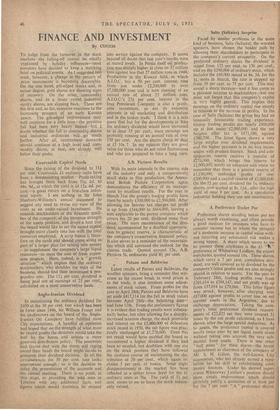Salts (Saltaire) Surprise
Faced by similar problems in the same kind of business, Salts (Saltaire), the worsted spinners, have chosen the bolder path by allowing their shareholders to participate in the company's current prosperity. On the preferred ordinary shares the dividend is raised from 125 per cent. to 150 per cent., and on the £290,000 of ordinary stock, which includes the £80,000 issued at 6s. 3d. for the Is. units in March, the rate is stepped up from 50 per cent. to 75 per cent. This may sound a sharp increase—and it has come as a pleasant surprise to stockholders—but one must not forget that this company's capital is very highly ,geared. This implies that earnings on the ordinary capital rise steeply in relation to the increase in profits. In the case of Salts (Saltaire) the group has had an unusually favourable trading experience. Group trading profits are nearly £900,000 up at just under '£2,000,000, and the net balance after tax is £871,100, against £500,200. The latest figure shows a very large surplus over dividend requirements, and the higher payment is in no way incon- sistent with prudent finance. Stock and con - tipgencies reserve receives a transfer of momo, which brings this reserve to £1;000,000, surely an adequate sum when we remember that there is a general reserve of £1,190,000, undivided profits of over £200,000 and a capital reserve of £1,000,000. On the 75 per cent, dividend the Is. ordinary shares, now quoted at 8s. 11d., offer the high yield of over 9 per cent. As a speculative industrial holding they are not unattractive.






















































 Previous page
Previous page